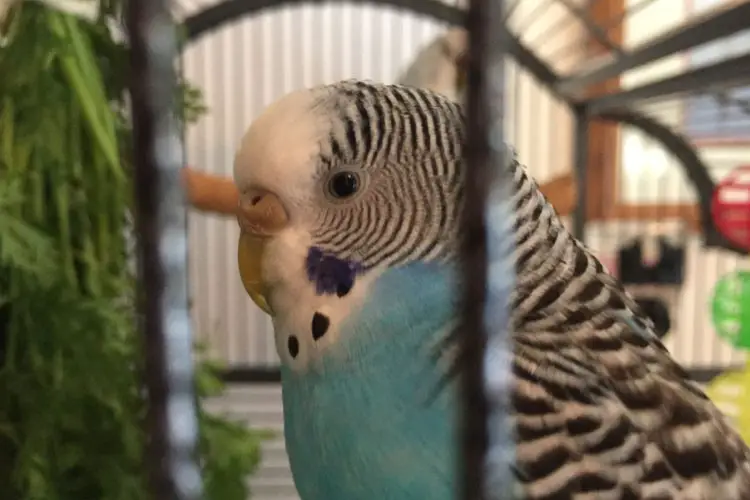Budgie pets are known for tricks like mimicry, fetch playing, through the hoop, and many more. However, some tricks make the budgie’s parents concerned rather than astonished. Occasionally facing the wall in budgies is troubling, especially to several first-time pet owners.
So, why does my budgie keep facing the wall? The common reasons why your budgie might be facing the wall is fear or stress. Budgies are often scared of new environments, mostly in their first days. However, if the pet is talking to its shadow, it might be mistaking it for another budgie.
Since budgies are wild animals, a lot in the home environment can startle or stress them. Continue reading to learn how you can build trust with these colorful pets known to be the best-talking birds.
Why Does My Pet Budgie Keep Facing the Wall?
As prey animals in the wild, budgies often worry if something in their environment scares them. Facing the wall can signify your pet is nervous, especially when they are in a new environment. A stressed budgie also tends to keep to itself, and facing the wall is one of the things they do.
Your pet budgie might also be facing the wall while doing head bobbing or chirping. Head bobbing is a sign they are happy, and talking to the wall shows they are bored. A lonely budgie pet will assume its shadow on the wall is another pet and start conversing with it.
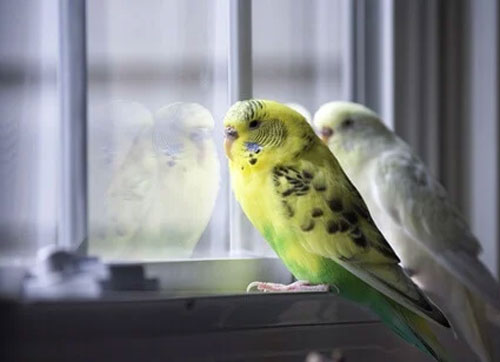
Since budgies are naturally playful and energetic, you may also consider engaging them. If they are used to the environment, it’s unlikely that they are frightened. You would be surprised to realize they are loaded with energy. They may behave in this manner when they don’t know how to respond to the energy within them.
Is It a Serious Problem If My Budgie Keeps Facing the Wall?
In most cases, when budgies face the wall it is not a concerning issue. However, if the reasons are not investigated, the bird can turn out with a critical problem. Since this is a habit they build with time, it’s best to solve it as soon as you notice it.
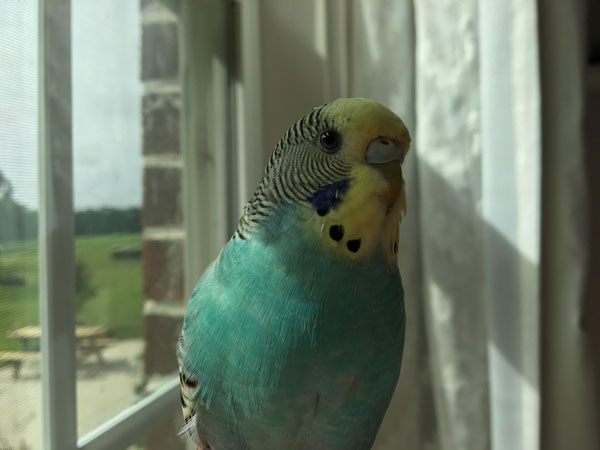
If your pet bird is stressed, you should find a way to make them happy sooner. Like other birds, the urban environment can stress budgies to some point where they even die. Provide new toys or add another pet to the cage to cheer your stressed bird.
How To Treat a Budgie That Keeps Facing The Wall?
To remedy this problem, a budgie parent must first understand the reason the bird is facing the wall. They can range from stress to just a nervous habit, with each having its own remedy. Sometimes budgie owners will reposition the cage to see if the budgie keeps facing the wall side or not.
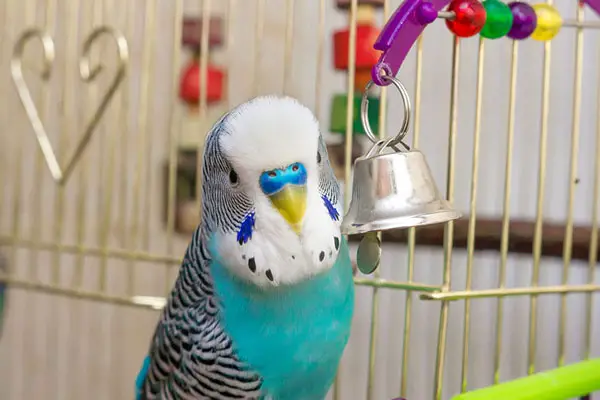
If you realize your budgie is talking to its shadow, it’s best to add another budgie to be their talking mate. Since they are social birds, they thrive in flocks when they interact with other birds. However, if you try all the remedies but your bird keeps the habit, take it to an avian vet.
Also read: Budgie Head Bobbing Up and Down
How To Build Trust with Your Budgie?
One among many hopes new budgie pet parents have is to get this colorful pet to trust them sooner. Building trust depends on several factors like the pet’s past experiences with humans and its temperaments. The below steps will guide you through a quicker process of gaining your pet’s trust.
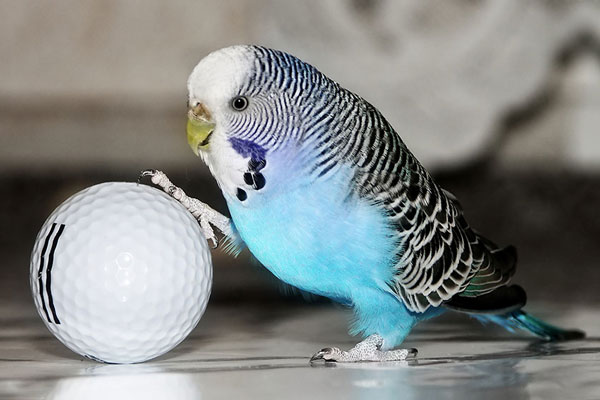
- Set up – Placing your pet in a comfortable environment that is calm will reduce the time your pet will take to settle.
- Dropping Treats – Make a habit of dropping some treats in your budgie’s cage whenever you are passing by without putting your fingers in. The bird will start waiting anxiously for you and your gifts.
- Handheld treats – Within a few weeks, the budgie will be more comfortable around you, signified by often preening, relaxed feathering, and playing. At this time, you can attempt giving treats from your hand, like the millet spray and seed sticks which are healthy.
- Open the cage – With well-timed treats when the budgie is hungry, deliver treats and foods yourself and try feeding some from your hands.
- Petting – By this step, the pet will be more comfortable around you, and you can attempt picking it. It is also a perfect time to introduce your happy budgie to the other birds in your flock.
- Familiarize – Frequent interactions with your pet will make it more comfortable for them to enjoy your company. In the first two days, avoid grabbing the pet and start by standing further and reducing the distance with time.
Building trust with your budgie may take some time, so be patient. Just as with human beings, these little, talkative birds need to analyze the environment. How you treat them during this period will determine the duration it takes before they stop acting worried.
How Do I Know If My Budgie is Stressed?
To correctly perceive actions like facing the wall, you need to understand how a stressed budgie acts. A startled or anxious bird will frequently flap its wings and become aggressive if you try to pet it. A distressed budgie will lose appetite, and some will have reduced chirping and mimicry.
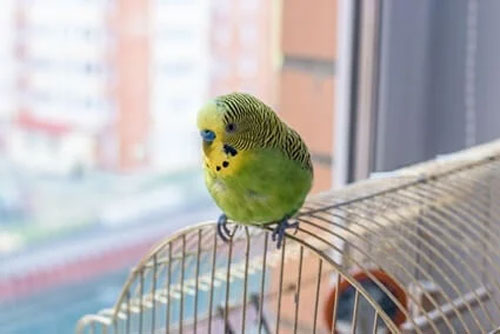
While in the cage, facing the wall often, head swinging, and pacing are other signs of a stressed pet. As you investigate the course of your pet’s distress, it’s best to give it space in this period. The best you can do is to add the pet more toys, and if possible, an additional budgie. Entertaining the pet with games and reduced cage time are also some ideal remedies you can try.
FAQ
When pet birds are withdrawn and appear stressed, they raise some concerns in their owners. These concerns are then accompanied by multiple questions that are yet to be answered. Below are frequently asked questions on this topic and their answers.
Your budgie is likely to go high up the cage facing the wall. Mostly this happens if you cover your cage. The budgie may fly to the highest point and face the wall. They do this when worried or because the atmosphere changes, mostly because the environment changes when you put the cover.
With some stresses causing reduced and poor feeding, your budgie might die if not acted upon quickly. The best way to stop your pet from stressing is by eliminating possible stress causes like loud music and appliances. Also, adding new toys and games might help reduce the pet’s stress.
An early indication that your budgie likes you is when they allow you to touch them and climb on your fingers. If the bird is frequently climbing upon your shoulders and hands is another sign that they trust you. A pet that loves and trusts you will also try to get your attention and even do more mimicry.
Related: Budgie Rubbing Head on Perch
Conclusion
These colorful Australian native pets are beautiful additions in many households. With many tricks and the ability to learn words, they serve as a great companion to budgie parents. Most of their actions are astonishing, while few of them are worrying.
The question of why is my budgie keeps facing the wall is common among many new budgie owners. A stressed budgie is known to have these behaviors and many others that you can use as signals. There are several ways to keep these pet birds from stressing out and trusting you for better companionship.
